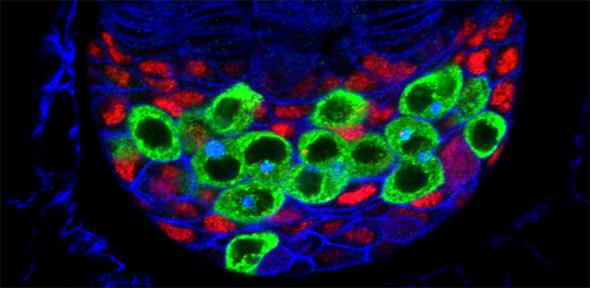
Molecular Mechanisms Controlling Germline Stem Cell Biology
Research Interests
We focus on the development of the germline, the ‘immortal’ cell lineage that provides the continuity of life and ensures the transmission of genetic information through generations. In particular, we are interested in the genetic and molecular mechanisms controlling germline stem cell behavior and protecting totipotency in vivo.
Gene expression regulation during stem cell self-renewal and differentiation
Germ cells are considered to be the ultimate stem cell lineage as they are competent not only to generate more germ cells but also to give rise to a new organism every generation. Not surprising, the study of the germline has been instrumental for the understanding of the mechanisms of pluripotency and stem cell biology, with broad implications to regenerative medicine, aging, and cancer. Our lab uses the Drosophila ovary as a model for studying germline stem cell biology because this system is amenable to detailed developmental analysis as well as for large-scale experimental approaches. Thanks to this, we were able to assemble the complete genetic framework controlling germline stem cell self-renewal and differentiation in vivo, revealing new aspects of germline development – including the translational control of stem cell cytokinesis, the uncoupling of ribosome biogenesis and protein synthesis rates during stem cell development, and an energy metabolism-independent function for mitochondria governing differentiation.
From plants to mammals, accumulating evidence indicates that regulation of protein synthesis plays critical roles during organism development, tissue homeostasis, and tumorigenesis. Yet, the study of spatiotemporal regulation of gene expression and its function in controlling stem cell biology has been mostly restricted to chromatin-based mechanisms. Nevertheless, gene expression analyses indicate that protein abundance in cells is mainly regulated at the translational level. Interestingly, translational regulation appears prominent in the germline, as no master transcription factor has been identified to specify germ cell fate. Using a combination of high-throughput molecular approaches, computational investigation, as well as developmental and genetic analyses, our goal is to dissect the molecular mechanisms by which protein synthesis control - a new frontier in gene regulation - governs key aspects of germline stem cell development in vivo.
Transposable elements and germline development
Repeat elements, such as transposable elements (TEs), make up about 30% and 50% of the Drosophila and human genomes, respectively. Since their discovery, TEs have been implicated in the organization, functioning, and evolution of genomes. However, TEs enhanced activity is detrimental to the host and therefore must be tightly regulated. This is especially true in the germline, where exacerbated TE activity can alter the inheritable genetic information.
A classic example of disruptive transposon activity is provided by hybrid dysgenesis in Drosophila, a syndrome that specifically affects germline development and is triggered by the P-element DNA transposon. In this system, the presence of epigenetically inherited small RNAs (sRNAs) cognate to the P-element correlates with germline protection, although the means by which this defense is achieved has remained elusive. Using this textbook example of genomic conflict and transgenerational epigenetics, our lab uses a combination of developmental and high-throughput molecular approaches to dissect the host-mechanisms controlling genome stability and transposon activity during germline development.
Further information about our research can be found on our website: https://karamteixeira.wixsite.com/website
Join Us
We welcome applications from enthusiastic, highly motivated students and talented postdocs. If you are interested in joining the lab, send an email to Felipe Karam Teixeira outlining your research interests. Also include a CV with the contact details of at least two people who can provide a letter of reference.
